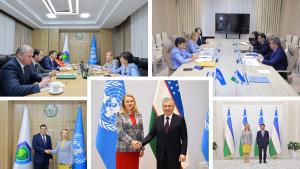Addressing the Tashkent International Investment Forum (2-3 May 2024), UNECE Executive Secretary Tatiana Molcean called for the mobilization of private sector investments to support the implementation of the Sustainable Development Goals (SDGs) and to foster regional cooperation in Central Asia. Keeping sustainability at the core of investments is essential to closing the gap on SDG financing, she stressed.
Meeting with the President of Uzbekistan, Shavkat Mirziyoyev, on the occasion of the Forum, Ms. Molcean reaffirmed UNECE support to Uzbekistan’s ambitious reform agenda on environment, innovation, trade, transport, and road safety, as well as to the country’s process of accession to the World Trade Organization (WTO).
Ms. Molcean continued the discussion on bilateral and regional cooperation on these issues in her meetings with Uzbekistan’s Minister of Foreign Affairs, Baxtiyor Saidov; Deputy Prime Minister and Minister of Economy and Finance, Djamshid Kuchkarov; Minister of Ecology, Environmental Protection and Climate Change, Aziz Abdukhakimov; Minister of Investment, Industry and Trade, Laziz Kudratov; and Minister of Energy, Jurabek Mirzamahmudov.
She presented the findings of the Road Safety Performance Review, which aim at putting the people, especially the most vulnerable road users, and safety at the heart of the country’s mobility system, to Deputy Minister of Internal Affairs, Bekmurod Abdullaev.
The WTO accession process is key for countries’ economic development, the UNECE Executive Secretary noted. But it also requires strengthening regional links, especially for the landlocked Central Asian region.
UNECE is already supporting SDG progress and regional cooperation in Central Asia through the United Nations Special Programme for the Economies of Central Asia (SPECA). SPECA brings together two UN Regional Commissions (UNECE and UNESCAP), UN Resident Coordinators in SPECA participating States, as well as various other UN and non-UN players, to cooperate on issues ranging from transport connectivity, innovation, and sustainable trade to gender equality, and the water-energy nexus.
UNECE legal instruments, standards, best practices, and guidelines underpin much of the regional cooperation promoted through SPECA. When it comes to trade and investments, UNECE’s Public Private Partnership (PPP) tools and Infrastructure Evaluation and Rating System (PIERS) can help governments leverage private sector investment for SDG-compliant infrastructure projects. Furthermore, UNECE’s Sustainability Pledge helps to ensure Environmental, Social and Governance (ESG) traceability in the textiles sector, which is important for countries’ economies in Central Asia.
UNECE has also provided capacity-building, especially in Uzbekistan, on innovation for the circular economy and empowering start-ups to innovate for the SDGs. Finally, UNECE has been supporting SPECA participating States in trade facilitation and eliminating regulatory and procedural barriers to trade, which is of great relevance for WTO accession.
Photo credits: Government of Uzbekistan
